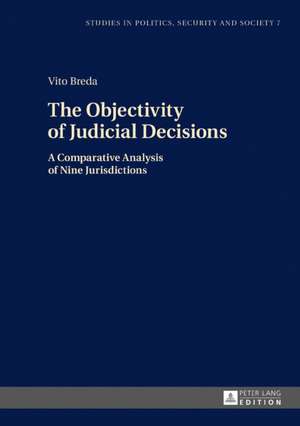The Objectivity of Judicial Decisions: Studies in Politics, Security and Society
Autor Vito Bredaen Limba Engleză Hardback – 29 noi 2016
Din seria Studies in Politics, Security and Society
-
 Preț: 534.29 lei
Preț: 534.29 lei -
 Preț: 426.44 lei
Preț: 426.44 lei - 23%
 Preț: 486.18 lei
Preț: 486.18 lei - 5%
 Preț: 412.97 lei
Preț: 412.97 lei -
 Preț: 534.67 lei
Preț: 534.67 lei - 23%
 Preț: 488.71 lei
Preț: 488.71 lei - 23%
 Preț: 488.71 lei
Preț: 488.71 lei -
 Preț: 531.39 lei
Preț: 531.39 lei - 23%
 Preț: 435.44 lei
Preț: 435.44 lei -
 Preț: 395.05 lei
Preț: 395.05 lei -
 Preț: 514.82 lei
Preț: 514.82 lei - 23%
 Preț: 475.07 lei
Preț: 475.07 lei -
 Preț: 520.03 lei
Preț: 520.03 lei -
 Preț: 511.37 lei
Preț: 511.37 lei -
 Preț: 494.31 lei
Preț: 494.31 lei - 23%
 Preț: 470.49 lei
Preț: 470.49 lei - 23%
 Preț: 453.89 lei
Preț: 453.89 lei -
 Preț: 301.75 lei
Preț: 301.75 lei -
 Preț: 496.82 lei
Preț: 496.82 lei - 23%
 Preț: 450.26 lei
Preț: 450.26 lei - 23%
 Preț: 456.05 lei
Preț: 456.05 lei -
 Preț: 489.47 lei
Preț: 489.47 lei -
 Preț: 534.45 lei
Preț: 534.45 lei -
 Preț: 534.08 lei
Preț: 534.08 lei - 23%
 Preț: 453.98 lei
Preț: 453.98 lei -
 Preț: 493.94 lei
Preț: 493.94 lei -
 Preț: 296.60 lei
Preț: 296.60 lei -
 Preț: 374.66 lei
Preț: 374.66 lei -
 Preț: 376.41 lei
Preț: 376.41 lei -
 Preț: 271.94 lei
Preț: 271.94 lei -
 Preț: 370.04 lei
Preț: 370.04 lei -
 Preț: 546.20 lei
Preț: 546.20 lei -
 Preț: 458.22 lei
Preț: 458.22 lei - 23%
 Preț: 459.49 lei
Preț: 459.49 lei -
 Preț: 403.49 lei
Preț: 403.49 lei - 23%
 Preț: 437.05 lei
Preț: 437.05 lei -
 Preț: 392.89 lei
Preț: 392.89 lei - 23%
 Preț: 461.42 lei
Preț: 461.42 lei -
 Preț: 458.04 lei
Preț: 458.04 lei -
 Preț: 549.09 lei
Preț: 549.09 lei - 8%
 Preț: 455.81 lei
Preț: 455.81 lei - 23%
 Preț: 488.42 lei
Preț: 488.42 lei -

Preț: 320.27 lei
Nou
Puncte Express: 480
Preț estimativ în valută:
61.28€ • 64.15$ • 51.01£
61.28€ • 64.15$ • 51.01£
Carte tipărită la comandă
Livrare economică 31 martie-14 aprilie
Preluare comenzi: 021 569.72.76
Specificații
ISBN-13: 9783631675908
ISBN-10: 3631675909
Pagini: 134
Dimensiuni: 154 x 215 x 17 mm
Greutate: 0.28 kg
Ediția:Nouă
Editura: Peter Lang Copyright AG
Seria Studies in Politics, Security and Society
ISBN-10: 3631675909
Pagini: 134
Dimensiuni: 154 x 215 x 17 mm
Greutate: 0.28 kg
Ediția:Nouă
Editura: Peter Lang Copyright AG
Seria Studies in Politics, Security and Society
Notă biografică
Vito Breda is the Research Leader of the Comparative Law Group at the School of Law of the University of Southern Queensland. He held a tenure position in Cardiff and renewed visiting chairs at the University of Deusto. His research interests include European Law and Comparative Law.
Cuprins
Judicial Impartiality in European Legal Systems - Judicial bias - Truth as a qualifier of judicial objectivity and judicial verophobia - Objective textual interpretation - Objectified judicial discretion - Objectivity as fairness.
Descriere
This book discusses how judges qualify their activities as objective. The data for this project was retrieved from a large sample of cases using Langacker's methodology. The sample included over a thousand decisions from Brazil, Hungary, Italy, Lithuania, Slovakia, Slovenia, Spain, Romania and the UK.
